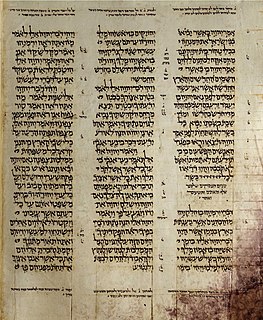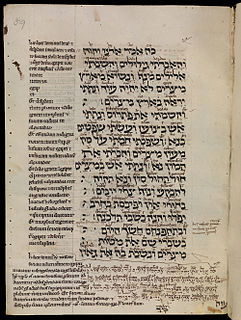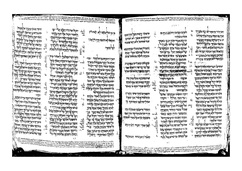
Jeremiah 1 is the first chapter of the Book of Jeremiah in the Hebrew Bible or the Old Testament of the Christian Bible. This book, one of the Nevi'im or Books of the Prophets, contains the prophecies attributed to the prophet Jeremiah. This chapter serves as an introduction to the Book of Jeremiah and relates Jeremiah's calling as a prophet.
Isaiah 51 is the fifty-first chapter of the Book of Isaiah in the Hebrew Bible or the Old Testament of the Christian Bible. This book contains the prophecies attributed to the prophet Isaiah, and is one of the Books of the Prophets. Chapters 40-55 are known as "Deutero-Isaiah" and date from the time of the Israelites' exile in Babylon. This chapter expresses the consolation of the Lord offered to the people of Israel.
Isaiah 5 is the fifth chapter of the Book of Isaiah in the Hebrew Bible or the Old Testament of the Christian Bible. This book contains the prophecies attributed to the prophet Isaiah, and is one of the Books of the Prophets.
Isaiah 4 is the fourth chapter of the Book of Isaiah in the Hebrew Bible or the Old Testament of the Christian Bible. This book contains the prophecies attributed to the prophet Isaiah, and is one of the Books of the Prophets.
Isaiah 60 is the sixtieth chapter of the Book of Isaiah in the Hebrew Bible or the Old Testament of the Christian Bible. This book contains the prophecies attributed to the prophet Isaiah, and is one of the Books of the Prophets. Chapters 56–66 are often referred to as Trito-Isaiah. In chapters 60–62, "three magnificent chapters", the prophet "hails the rising sun of Jerusalem’s prosperity".
Isaiah 26 is the twenty-sixth chapter of the Book of Isaiah in the Hebrew Bible or the Old Testament of the Christian Bible. This book contains the prophecies attributed to the prophet Isaiah, and is one of the Books of the Prophets. Chapters 24-27 of Isaiah constitute one continuous poetical prophecy, sometimes called the "Isaiah Apocalypse".
Isaiah 29 is the twenty-ninth chapter of the Book of Isaiah in the Hebrew Bible or the Old Testament of the Christian Bible. This book contains the prophecies attributed to the prophet Isaiah, and is a part of the Book of the Prophets. The Jerusalem Bible groups chapters 28-35 together as a collection of "poems on Israel and Judah".
Isaiah 34 is the thirty-fourth chapter of the Book of Isaiah in the Hebrew Bible or the Old Testament of the Christian Bible. This book contains the prophecies attributed to the prophet Isaiah, and is a part of the Book of the Prophets. The Jerusalem Bible groups chapters 28-35 together as a collection of "poems on Israel and Judah", although this chapter is addressed to all nations and to Edom in particular.
Isaiah 43 is the forty-third chapter of the Book of Isaiah in the Hebrew Bible or the Old Testament of the Christian Bible. This book contains the prophecies attributed to the prophet Isaiah, and is one of the Books of the Prophets.
Isaiah 47 is the forty-seventh chapter of the Book of Isaiah in the Hebrew Bible or the Old Testament of the Christian Bible. This book contains the prophecies attributed to the prophet Isaiah, and is a part of the Books of the Prophets. Isaiah 40-55 is known as "Deutero-Isaiah" and dates from the time of the Israelites' exile in Babylon. Chapter 47 concerns the fall of Babylon, which is personified as a woman, "the virgin daughter of Babylon", "daughter of the Chaldeans", no longer to be called "the Lady of Kingdoms" or "a Lady for ever".
Isaiah 62 is the sixty-second chapter of the Book of Isaiah in the Hebrew Bible or the Old Testament of the Christian Bible. This book contains the prophecies attributed to the prophet Isaiah, and is one of the Books of the Prophets. Chapters 56-66 are often referred to as Trito-Isaiah. In chapters 60-62, "three magnificent chapters", the prophet "hails the rising sun of Jerusalem’s prosperity".

Jeremiah 23 is the twenty-third chapter of the Book of Jeremiah in the Hebrew Bible or the Old Testament of the Christian Bible. This book contains prophecies attributed to the prophet Jeremiah, and is one of the Books of the Prophets.

Jeremiah 2 is the second chapter of the Book of Jeremiah in the Hebrew Bible or the Old Testament of the Christian Bible. This book contains prophecies attributed to the prophet Jeremiah, and is one of the Books of the Prophets. Chapters 2 to 6 contain the earliest preaching of Jeremiah on the apostasy of Israel. Verses 2:1 to 3:5 dramatize the ending of "marriage" between Yahweh and Israel.

Jeremiah 5 is the fifth chapter of the Book of Jeremiah in the Hebrew Bible or the Old Testament of the Christian Bible. This book contains prophecies attributed to the prophet Jeremiah, and is one of the Books of the Prophets. Chapters 2 to 6 contain the earliest preaching of Jeremiah on the apostasy of Israel. This chapter is sub-titled "The Justice of God’s Judgment" in the New King James Version.

Ezekiel 17 is the seventeenth chapter of the Book of Ezekiel in the Hebrew Bible or the Old Testament of the Christian Bible. This book contains the prophecies attributed to the prophet/priest Ezekiel, and is one of the Books of the Prophets. This chapter tells, and then interprets, the riddle of the great eagle.

Jeremiah 8 is the eighth chapter of the Book of Jeremiah in the Hebrew Bible or the Old Testament of the Christian Bible. This book contains prophecies attributed to the prophet Jeremiah and is one of the Books of the Prophets. Chapters 7 to 10 constitute an address delivered by Jeremiah at the gate of the Temple in Jerusalem.

Jeremiah 14 is the fourteenth chapter of the Book of Jeremiah in the Hebrew Bible or the Old Testament of the Christian Bible. This book contains prophecies attributed to the prophet Jeremiah, and is one of the Books of the Prophets.

Jeremiah 33 is the thirty-third chapter of the Book of Jeremiah in the Hebrew Bible or the Old Testament of the Christian Bible. It is numbered as Jeremiah 40 in the Septuagint. This book contains prophecies attributed to the prophet Jeremiah, and is one of the Books of the Prophets.

Jeremiah 28 is the twenty-eighth chapter of the Book of Jeremiah in the Hebrew Bible or the Old Testament of the Christian Bible. The material found in Jeremiah 28 of the Hebrew Bible appears in Jeremiah 35 in the Septuagint. This book contains prophecies attributed to the prophet Jeremiah, and is one of the Books of the Prophets. This chapter contains a confrontation between prophets Jeremiah and Hananiah: Hananiah's false prophecy is responded by Jeremiah's answer, Jeremiah 28:1-9. Hananiah breaks Jeremiah's yoke, Jeremiah foretells an iron yoke, and Hananiah's death, Jeremiah 28:10-17.

Jeremiah 48 is the forty-eighth chapter of the Book of Jeremiah in the Hebrew Bible or the Old Testament of the Christian Bible. This book contains prophecies attributed to the prophet Jeremiah, and is one of the Books of the Prophets. This chapter is part of a series of "oracles against foreign nations", consisting of chapters 46 to 51. In particular, chapters 46-49 focus on Judah's neighbors. This chapter contains the poetic oracles against Moab.



